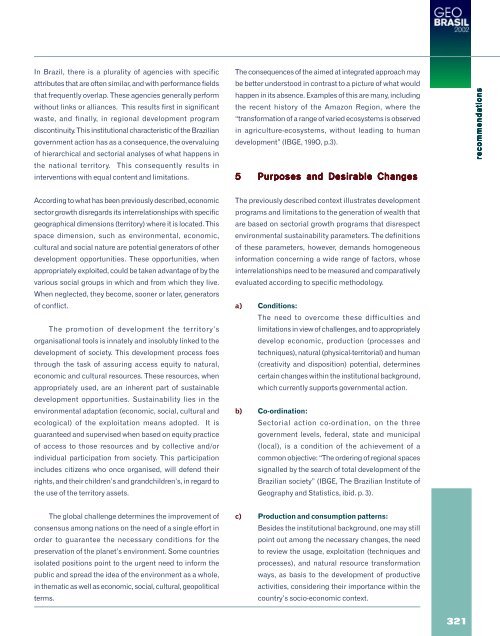GEO Brasil - UNEP
GEO Brasil - UNEP
GEO Brasil - UNEP
Create successful ePaper yourself
Turn your PDF publications into a flip-book with our unique Google optimized e-Paper software.
In Brazil, there is a plurality of agencies with specific<br />
attributes that are often similar, and with performance fields<br />
that frequently overlap. These agencies generally perform<br />
without links or alliances. This results first in significant<br />
waste, and finally, in regional development program<br />
discontinuity. This institutional characteristic of the Brazilian<br />
government action has as a consequence, the overvaluing<br />
of hierarchical and sectorial analyses of what happens in<br />
the national territory. This consequently results in<br />
interventions with equal content and limitations.<br />
The consequences of the aimed at integrated approach may<br />
be better understood in contrast to a picture of what would<br />
happen in its absence. Examples of this are many, including<br />
the recent history of the Amazon Region, where the<br />
“transformation of a range of varied ecosystems is observed<br />
in agriculture-ecosystems, without leading to human<br />
development” (IBGE, 199O, p.3).<br />
5 Purposes and Desirable Changes<br />
recommendations<br />
According to what has been previously described, economic<br />
sector growth disregards its interrelationships with specific<br />
geographical dimensions (territory) where it is located. This<br />
space dimension, such as environmental, economic,<br />
cultural and social nature are potential generators of other<br />
development opportunities. These opportunities, when<br />
appropriately exploited, could be taken advantage of by the<br />
various social groups in which and from which they live.<br />
When neglected, they become, sooner or later, generators<br />
of conflict.<br />
The promotion of development the territory’s<br />
organisational tools is innately and insolubly linked to the<br />
development of society. This development process foes<br />
through the task of assuring access equity to natural,<br />
economic and cultural resources. These resources, when<br />
appropriately used, are an inherent part of sustainable<br />
development opportunities. Sustainability lies in the<br />
environmental adaptation (economic, social, cultural and<br />
ecological) of the exploitation means adopted. It is<br />
guaranteed and supervised when based on equity practice<br />
of access to those resources and by collective and/or<br />
individual participation from society. This participation<br />
includes citizens who once organised, will defend their<br />
rights, and their children’s and grandchildren’s, in regard to<br />
the use of the territory assets.<br />
The previously described context illustrates development<br />
programs and limitations to the generation of wealth that<br />
are based on sectorial growth programs that disrespect<br />
environmental sustainability parameters. The definitions<br />
of these parameters, however, demands homogeneous<br />
information concerning a wide range of factors, whose<br />
interrelationships need to be measured and comparatively<br />
evaluated according to specific methodology.<br />
a) Conditions:<br />
The need to overcome these difficulties and<br />
limitations in view of challenges, and to appropriately<br />
develop economic, production (processes and<br />
techniques), natural (physical-territorial) and human<br />
(creativity and disposition) potential, determines<br />
certain changes within the institutional background,<br />
which currently supports governmental action.<br />
b) Co-ordination:<br />
Sectorial action co-ordination, on the three<br />
government levels, federal, state and municipal<br />
(local), is a condition of the achievement of a<br />
common objective: “The ordering of regional spaces<br />
signalled by the search of total development of the<br />
Brazilian society” (IBGE, The Brazilian Institute of<br />
Geography and Statistics, ibid. p. 3).<br />
The global challenge determines the improvement of<br />
consensus among nations on the need of a single effort in<br />
order to guarantee the necessary conditions for the<br />
preservation of the planet’s environment. Some countries<br />
isolated positions point to the urgent need to inform the<br />
public and spread the idea of the environment as a whole,<br />
in thematic as well as economic, social, cultural, geopolitical<br />
terms.<br />
c) Production and consumption patterns:<br />
Besides the institutional background, one may still<br />
point out among the necessary changes, the need<br />
to review the usage, exploitation (techniques and<br />
processes), and natural resource transformation<br />
ways, as basis to the development of productive<br />
activities, considering their importance within the<br />
country’s socio-economic context.<br />
321
















